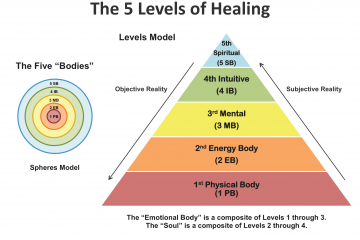Has Covid-19 been good for us? Four lessons from a Holistic Perspective

The impact of Covid-19 on people’s physical, mental and financial health has truly been immeasurable. But can Covid-19 help protect us from chronic disease in the long-run?
In this article, I will be discussing what I believe we can learn from Covid-19 from a holistic perspective and explain why we should all be building our ‘health infrastructure’ for long-term health.
Please note: This article is an opinion piece written for those open and willing to look beyond the narrative of mainstream media and centralised healthcare.
Today, our culture is focussed on learning to achieve wealth and success. There have literally been thousands of books and TV shows produced on the subject. In fact, the average person spends between 60-80% of their waking life at work, hopefully saving and building for a better financial future.
But I’d like you to imagine the feeling of achieving financial security in your 50’s or 60’s and then being ‘suddenly’ diagnosed with Cancer, Parkinson’s, Dementia or Arthritis?
If you think I’m being dramatic, age associated diseases are steadily on the rise. Between 1 in 2 and 1 in 4 people will be diagnosed with cancer in their lifetime (1). By 2040 1.5 million people will have dementia (2). Not to mention the host of ‘common’ conditions from thyroid to diabetes to heart disease.
So what happens now? Was all that hard work for nothing? Maybe not, because you can take care of your family right?

I’m not so sure. I am sure if your spouse or child had to choose between having ‘abundance’ or having you: they would choose you (most of the time).
Are you sick of it?
Recently I’ve watched the same story ‘play out’ over and over again. Just this year (2020):
- A father of three sells his business and hopes to enjoy a lovely retirement. A year later he passes away with cancer.
- A friend skimps and saves to pay off his mortgage. As he approaches retirement age (mortgage free), his wife is diagnosed with cancer.
- A client with type 2 diabetes and obesity worked for a national airline his entire life. Due to his diabetes he frequently develops leg ulcers and nerve damage. He was forced to take early retirement and has accrued a lifetime of free air travel. There’s only one problem. He can’t walk properly and due to his health history, he will be unable to secure travel insurance.
I’m sick of it! I’m sick of seeing smart intelligent people, taking care of their financial well-being without taking care of their physical well-being and act surprised when they are diagnosed with serious illness.
When asked what surprised him most about humanity the Dalai Lama responded:
“Man, because he sacrifices his health in order to make money. Then he sacrifices money to recuperate his health.”
The Dalai Lama
‘Self-Determination’ versus ‘The Nanny State’
Note: I am almost talking exclusively about health in this article. This is controversial I know, and I’m happy to be wrong, in fact I hope what I’m about to say is wrong.
Regardless of what you think of Donald Trump, the Covid-19 crisis has emphatically highlighted the differences between political ideologies i.e. The Free market (Republicans or Tories) versus The Nanny State (Democrats or Labour).
If you live in the Western world, you are lucky enough to have choice. As a wise man once said to me: ‘The greatest asset you will ever own is freedom’.
We can choose what we study, where we live, how we work, and how we look after our own health and well-being.

We can seek the advice of conventional doctors, osteopaths, chiropractors, nutritional therapists, reflexologists and the list goes on…we are extremely lucky to have that choice (if we are willing and able to pay for it).
Think of it like this. In court, lawyers provide advice and act on your ‘instruction’. In accountancy, they act on your behalf but it’s your signature on the tax return. In medicine, healthcare professionals provide an ‘opinion’, but you give ‘consent’.
There are of course situations when we don’t have a choice.
But outside of the hospital we absolutely have a choice. We are lucky.
I know medicine is different because we are dealing with human health. We therefore should be trusting the system filled with professionals who have dedicated their lives to our care. Right? Right?
Well….
Seeking Alternative Education
Modern medicine has only existed for approximately 100 years (doctors began washing their hands in 1890) (3).
Relative to Ayurveda, Traditional Chinese Medicine and even Homeopathy, which have been around for centuries, modern medicine is still in its infancy. (I am not suggesting Ayurveda or TCM should replace modern medicine).
There’s no question most doctors and researchers are good well-meaning people. Doctors dedicate their lives and often their own health and personal lives to look after us in our time of need.
However, doctors have little say over their training curriculum and simply learn the information they need to pass exams, ‘manage’ patients and avoid litigation. That is the modus operandi of most doctors.
But training curriculums are typically dictated by government organisations which operate inefficiently and not always in your best interest…
Government Failure

If you’ve ever studied economics, one of the first things you learn is that ‘governments are inherently inefficient organisations compared to the private sector’ (4).
In other words, theoretically, in government, the allocation of money, people and information will likely be wasted or misused.
State governed education is a great example.
At school we are taught the basics of biology, chemistry and physics. If we choose to become health professionals, 98% of courses are spent teaching us to react and ‘treat’ disease, not to prevent it.
Just like in the same way, traditional education doesn’t teach us how to procure wealth, it doesn’t teach us how to prevent disease and optimise our health. (I know we don’t have all the answers yet).
As Lord Ara Darzi a former surgeon and health minister shared in an interview with The Economist ‘The government needs to transform the NHS from a sickness service to a health and well-being service’ (1)
Currently, the NHS primarily relies on drugs and surgery to treat or react to disease. I’m confident one day in the future, the NHS will utilise lifestyle and nutraceutical interventions to prevent and address illness in a safer more efficient manner.
But I digress.
While silicon valley is leading us towards the twenty-second century, the medical establishment is leading the way back to the nineteenth…
Dr Dale Bredesen
My point is we simply cannot rely on government to give us the best information and resources to help our own unique situation.
Modern healthcare has been condensed into a reductionist conveyor-belt like system.
I do believe it does it’s best, and I certainly do not envy policymakers. Government plays an important role in protecting the public from harm or exploitation.
But at the end of the day, as long as human beings control the system, ‘mistakes’ and abuse will happen.
There are multiple factors at play including the sensitive egos of academia (Dr Toni Fauchi is a great example), stock performance of pharma companies, relationships and simply a lack of research (i.e an inefficient allocation of resources).
In fact, it takes an average of 17 years for research evidence to reach clinical practice! (6)
We must remember, that even though we have the MHRA, NICE and GMC to scrutinise the effectiveness and safety of therapies, much of this work is predicated on a single paradigm. That disease can be treated by addressing a single or limited number of variables…i.e. a drug or surgery in most cases.
There is a reason despite the billions of dollars invested, we have yet to find a drug or drug cocktail that treats and reverses diseases like Cancer and Alzheimer’s Disease (7).
Chronic disease is rarely driven by single variables. There are multiple factors at play and we must use what we have to address as many as possible to maximise our chances of success.
I’ve rambled on enough. Let’s get on with it.
Lessons from Covid-19
1. Change The Way You See ‘Dis-ease’
If you remember one thing form this article:
‘Dis-ease’ is complex with many moving parts. Modern healthcare only addresses a few of them. In order, to address as many of those moving parts as possible a holistic approach is required.
And a holistic approach requires a change in the way we see disease. Disease is not something that simply happens ‘out of the blue’. Disease arises as a result of years and years of ‘dis-ease’. We must acquire the tools to recognise and intervene before it is too late.
Covid-19 is a classic example. ‘Stay at home, prevent exposure’. If you get it ‘stay at home and if you deteriorate the NHS will react and treat you in hospital’.
Well how about optimising your nutrient status with optimised diet and supplementation on the first day you experience symptoms to possibly reduce the risk of complications? (10, 11, 12, 13)
Which by the way, has almost zero downside compared with a two week stay in hospital (14).
Once you accept the traditional system offers debilitating messages containing the opposite of what you need to do to prevent and ‘treat’ disease and live optimally….you have the power.
2. We Cannot Rely on Governments or anyone else for our own Health and Well-being. We must empower ourselves.
Governments have the agility of Arthritic Elephants in a time when we need to have the agility of a sprightly cheetah.
Despite pandemics having been at the top of the National Risk Register since it’s inception in 2008 (8) and the Trump administration being briefed about an impending novel influenza H9N2 by the Obama administration (9). Covid-19 was an ‘unprecedented’ event.
I’m not a conspiracy theorist, just a humanist. As long as human beings control the system, mistakes and abuse will happen for various reasons.
But the point is governments are reactive and don’t always have our best interests ‘at heart’ because the system is outdated and not designed to optimise health, only to react when something goes wrong.
But the private sector is full of snake oil salesmen wanting to make money right?
As they say, ‘the cream and scum both rise to the top’. In a private system, you get snake oil salesmen. Guess what: in a state system, you get snake oil salesmen too.
“Having worked in the NHS for a while, it astounds me how many of my colleagues don’t see what they do stems from capitalist principles. The NHS operates like a business just like any other. Healthcare is a business just like any other. People buy from people and the relationships between leadership and vendors functions like any other. People need to appreciate that the equipment and sometimes medications they need are often supplied based on relationships.”
Anonymous
You could argue I am one, but I’m not interested in whether you believe me. I’m interested that you think about this message, explore and form your own opinion.
3. Make Informed Choice
I don’t want you to believe my words. I encourage you to explore the research I provide and combine it with various sources.
It is simply hazardous to believe one source alone. Remember, often the truth does not make headlines because often truth is not sensational or emotive.
The agenda is the agenda itself: To capture ‘eyeballs’ and sell papers.
The only way to make informed choice is to seek alternative education and alternative forms of media to form your own opinion. Even better is to delve into the primary sources of information. For example when you read an article about the results of a drug treatment: read the paper yourself.
4. Build Your Health ‘Infrastructure’
Like any good business person, you work to minimise your risk by hedging and creating a range of revenue streams. Why does this not apply to health?
It baffles me, why patients and some doctors shun the idea of complimentary interventions. Sure, there is a lot we don’t know. But equally there is a lot we do know, and there is almost zero downside, only incredible upside of taking charge of your health.
But How? By building your ‘Health Dream Team‘
There is no single way to do this. The most important thing is to find people who you trust and are extremely good at what they do. In my health team, I have a GP, Nutritional Therapist, TCM practitioner and BodyTalk therapist.
How you do this is not so important. It’s about recognising the issues, accepting it and being motivated to take the action required to look after yourself and your loved ones. We are the only ones truly responsible for our health. No one else.
Wishing you well on your path to health,
Inder



0 Comments